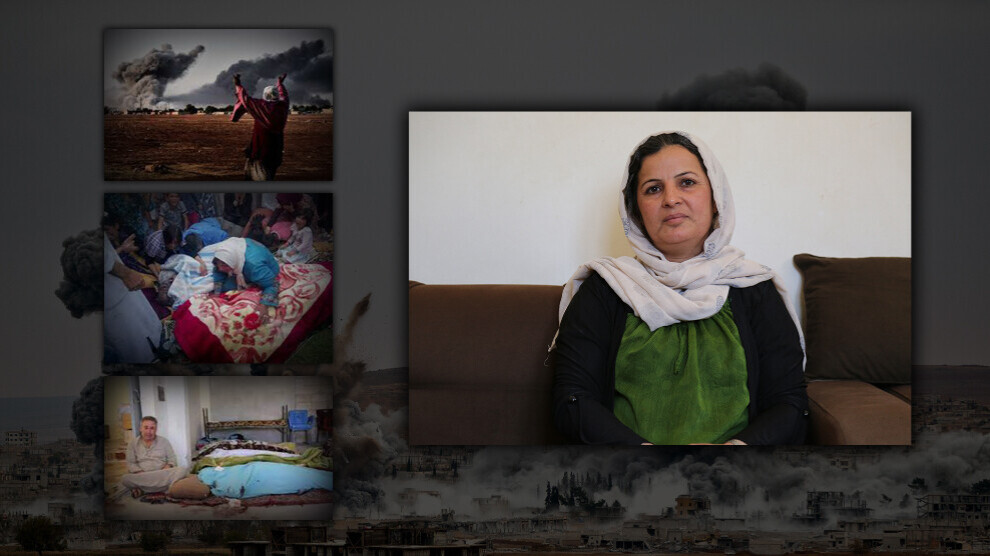7th anniversary of Kobanê Massacre: Anger turned into revolution
The Kobanê Massacre was committed by ISIS in Kobanê between June 25 and 28, 2015 after its defeat in the city. 233 people were killed during the massacre.

BERÇEM CÛDÎ
Kobanê - Kobanê, the stronghold of resistance and victory, is one of the cities of Rojava, where the first step for the revolution was taken. With the revolution, the people of Kobanê began to know the ideology of the Kurdistan Freedom Movement and the first step for the 19 June Revolution was taken in their city. This revolution led by women who educated themselves with the philosophy and ideology of freedom spreads across North and East Syria now. It becomes a source of hope for Kurdistan, the Middle East and humanity.
The liberation of Kobanê
The revolution that started in Rojava and was based in Kobanê was seen as a threat by many sovereign powers. Meanwhile, ISIS emerged and carried out brutal attacks in many countries, particularly in Syria and Iraq, and took control of many cities. Turkey used ISIS for its own interests and directed its attacks to Kobanê on September 15, 2014. After the attacks, many people and organizations called for protecting Kobanê in order to prevent a massacre to be committed in Kobanê. Then, a mobilization was declared to protect the city. Thousands of young women and men went to Kobanê to fight ISIS along with the fighters of the YPG and YPJ. After 134-day resistance, the city was liberated from ISIS on January 27, 2015.
233 people were killed
After the liberation of the city, the people of Kobanê, who fled to Northern Kurdistan, returned to their city and began to rebuild their city. However, ISIS attacked Kobanê and its surroundings with the support of Turkey on June 25, 2015. 233 people were brutally killed in the attacks. On the 7th anniversary of the Kobanê Massacre, NuJINHA spoke to Sara Xelîl, a member of the Women’s Council of the Democratic Union Party (PYD). Sara Xelîl is one of the women having fought ISIS in Kobanê and her husband was one of the killed people in the city.
Mobilization was declared
Sara Xelîl, one of the witnesses of the Kobanê Massacre, recalled the resistance in the city against ISIS and said, “ISIS attacked Kobanê on September 15, 2014. Before the attacks, Kobanê was surrounded on three sides by the Turkish state and mercenaries. When the attacks reached the city center, the leader (Abdullah Öcalan) called on the Kurdish people and their friends to protect Kobanê. After his call, a mobilization was declared for Kobanê. The people in Northern Kurdistan kept watch and ward in order to prevent ISIS from entering the city since the Turkish state trained ISIS members and opened the border for them. People from many countries also came to the city in order to protect the city.”
Kobanê was liberated
Speaking about the Kobanê Massacre, she said, “We faced many difficulties against ISIS' tanks and artillery, but we showed great resistance by using rifles against ISIS. Especially, women fighters waged a great resistance against the mindset of ISIS. Despite all the brutal attacks, Kobanê was liberated from ISIS on January 27, 2015. On that date, the Turkish state and ISIS were defeated. Erdoğan always said, ‘Kobanê is about to fall to ISIS’. After the defeat of ISIS, the Turkish state showed its intolerance. For this reason, ISIS committed the Kobanê Massacre shortly after the liberation of the city. ISIS killed children, women, old people and even pregnant women.”
Their anger turned into a revolution
Sara Xelîl also talked about the aim of the massacre and said, “Kobanê has many differences and features from other cities in Rojava. The leader Apo (Abdullah Öcalan) first entered Rojava from Kobanê. It was the center of the 19 July Revolution and ISIS was first defeated in Kobanê. For this reason, the Turkish state and Turkish-backed factions spilled out hatred against Kobanê.”
The massacre in Kobanê increased the determination of YPJ and YPG fighters to liberate the cities such as Sirin, Manbij, Tabqa, Raqqa and Deir ez-Zor in NE Syria from ISIS brutality.
